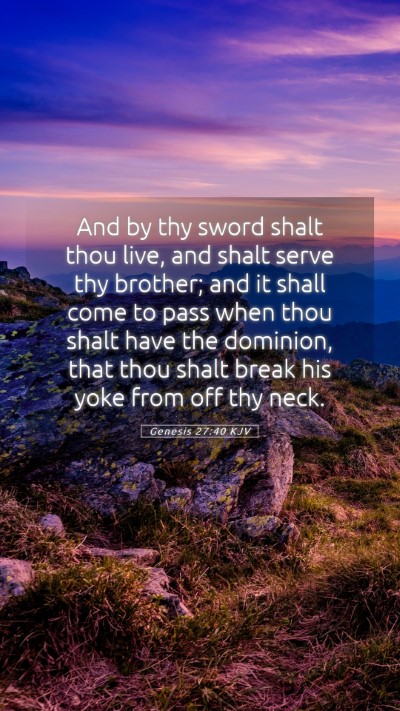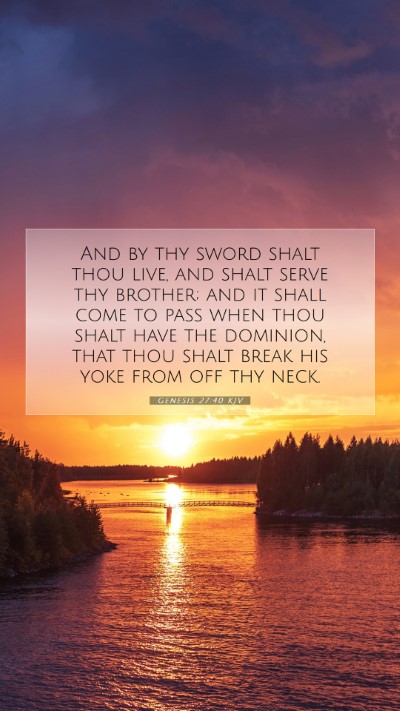Understanding Genesis 27:40
Genesis 27:40 states:
"And by your sword you shall live, and you shall serve your brother; but when you grow restless, you shall break his yoke from your neck."
This verse is part of the narrative surrounding the blessing of Jacob and Esau, where Isaac, their father, speaks prophetic words over the future of both sons. Let's delve into its meanings and interpretations.
Bible Verse Meaning
The interpretation of Genesis 27:40 requires a multidimensional examination, and insights from various biblical commentaries provide depth to its understanding.
Matthew Henry's Commentary
Matthew Henry emphasizes that this prophecy mirrors the historical tensions between the descendants of Jacob (Israel) and Esau (Edom). He highlights that Esau's existence will be marred by servitude and conflict but insists that the promise of eventual liberation is paramount. Henry articulates that this foreshadows not just the physical battles but the spiritual implications where Israel often overcame their foes, illustrating God’s ultimate sovereignty over nations.
Albert Barnes' Analysis
Albert Barnes provides a detailed exegesis of the phrase "by your sword you shall live." He points out that the martial undertones indicate a life led by conflict, which signifies survival through strength and struggles. Moreover, the reference to breaking the yoke is interpreted as a future reclamation of independence. Barnes notes the cyclical nature of oppression and liberation, suggesting a profound narrative regarding God’s plan for redemption and freedom.
Adam Clarke's Exposition
Adam Clarke offers a historical context to this blessing and highlights the idea that servitude to Jacob’s family would characterize Esau's future but not define it forever. Clarke analyzes the term "grow restless," indicating the innate human desire for freedom and autonomy, reinforcing that even in periods of subjugation, hope for liberation remains significant.
Combined Insights from Commentaries
- Conflict and Independence: The verse encapsulates a prophetic view of ongoing struggles but also of eventual freedom, portraying a dual narrative of bondage and liberation.
- Historical Significance: The implications extend beyond personal destinies and into the dynamics between nations, especially Israel and Edom.
- Divine Sovereignty: The underlying message is God's control over the course of human histories, re-emphasizing that even amidst human schemes, His will prevails.
Application to Daily Life
Understanding Genesis 27:40 provides key insights concerning the challenges we face in life:
- Resilience in Adversity: Just as Esau is prophesied to live by his sword, we too may navigate difficulties. This can inspire perseverance through life's challenges.
- Freedom through Christ: The promise of breaking free from yokes symbolizes spiritual liberation available to believers in Jesus, reinforcing the belief in redemption.
- Hope in Prophecy: This verse encourages the faithful to hold onto hope, as history shows cycles of hardship and freedom, ultimately orchestrated by God.
Bible Verse Commentary Summary
The commentary surrounding Genesis 27:40 aligns itself with broader themes explored throughout Scripture. The richness of the text can inspire Bible study groups and individuals seeking deeper understanding through:
- Bible study lessons focusing on the character of Esau and Jacob.
- Online Bible study resources that explore the significance of biblical blessings.
- Guides on the historical context of the Old Testament and its implications for New Testament teachings.
Related Scriptures
- Genesis 25:23 - The Lord speaks to Rebekah about her children.
- Malachi 1:2-3 - God’s love for Jacob and hatred for Esau.
- Hebrews 12:16-17 - A cautionary tale about Esau's foolishness and loss of his birthright.
Final Thoughts
Genesis 27:40 serves not just as a historical narrative but also a profound source of spiritual insight. The tensions between Jacob and Esau are reflective of broader themes within the biblical context, emphasizing faith, struggle, and the ultimate triumph of God’s will. Whether one studies in groups or as individuals, the lessons drawn from this passage continue to illuminate paths of understanding Scripture.


